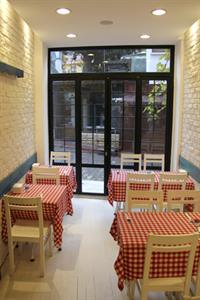
Orange County Environmental Health is the enforcement agency that issues permits which authorize a person to operate a food facility or cottage food operation within Orange County.

Food facilities include but are not limited to restaurants, bars, markets, public or private school cafeterias, carts, trucks, food booths at events, certified farmer’s markets, commissaries, wholesale food manufacturers and food warehouses. The health inspector assigned to your area can help you determine what kind of food facility your operation falls under. Knowing the type of food facility operation will help you and your inspector figure out requirements, fees, and the type of health permit.
All food facilities that store, prepare, package, serve, vend, or otherwise provide food and beverage for human consumption at a retail or wholesale level must have a valid health permit. Raw, cooked or processed edible substances, ice, water, and chewing gum are examples of food.
Businesses that display 25 square feet of prepackaged non-potentially hazardous foods are not required to obtain a health permit, but must register with Environmental Health acknowledging that they must comply with applicable sections of the California Retail Food Code.
To learn more about selling or making food from a private residence, refer to Cottage Food Operations.
What do I do if I am taking over an existing food facility or just planning to change the facility name?
Health Permits are not transferrable. If you are taking over a food facility and have not changed the menu/method of operation which requires the addition of equipment or made any other changes (i.e. remodel), you begin by contacting the Environmental Health Division at (714) 433-6000.
Prior to being issued a Health Permit, an inspection will be completed to determine that the proposed facility and its method of operation meets the requirements of the California Health and Safety Code and applicable ordinances.
If the food business is currently not in operation, a site evaluation may be required. This site evaluation ensures that the proper equipment is available to support the proposed food operation. The site evaluation will include, but not be limited to, a review of the type of food service proposed, identification of the risk category, and review of necessary equipment.
If the food business has remained in operation and there has not been any remodeling or a change in operation, the Health Department will conduct an unannounced routine inspection and may provide conditional approval to operate pending submission of the completed Health Permit Application and payment of the initial annual health permit. Once this conditional approval has been granted, the following will need to be submitted to Environmental Health within (7) business days:
 How about if I plan to build, remodel, bring in new equipment, or change the menu?
How about if I plan to build, remodel, bring in new equipment, or change the menu?You should obtain a written approval of your plan or proposal prior to any of the following:
Not all proposals require plan submittal so it’s important that you communicate with the health inspector assigned to the proposed food facility location. When construction is involved, you are required to submit 3 sets of plans and specifications for review and approval prior to construction. A specific plan check construction guide for each type of food facility and fee schedules are available online at Plan Check. Once the plans, application and plan check fees are submitted to our office at 1241 E Dyer Rd Suite 120, Santa Ana, an Environmental Health plan checker will be assigned to review your plans. It usually takes 20 working days for the initial Food Facility plan review. This is what you can expect:
You may not start construction until plans from all agencies have been reviewed and approved in writing.
Equipment used in a food facility needs to be approved and meet applicable standards. Even small changes can affect the safety, operation and/or other equipment in the food facility. Like for like equipment changes may not require approval. You should contact your health inspector and obtain approval for any changes before going through unnecessary cost and unexpected circumstances.

Food booths are also known as Temporary Food Facilities (TFF) . Since health permits are not transferable, you need to obtain a separate permit for your TFF. TFFs can be operated at community events, farmers markets, or swap meets. Remember, not all events are community events. Your health inspector can make that determination. There are specific requirements for TFFs to obtain a permit.
Carts and Trucks are referred to as Mobil Food Facilities (MFF) . If you are starting fresh with a new MFF, planning to remodel an MFF, or make a significant change in equipment, menu, or operations, you need to submit plans for approval. The proposed MFF design/construction, equipment, menu, and operations will be reviewed by the Environmental Health inspector during a plan review process. For your convenience, refer to the Plan Check Submittal Checklist that will help you with what is needed to be included in your plan submission.
If you are taking over a cart, truck, or commissary, you can contact our Mobile Food Facility Program at (714) 433-6416 and make an appointment with the health inspector to set up an inspection, and if approved, obtain a health permit.

Self-storage units do not meet the requirement for the wholesale food facility. There are specific requirements for packaged and unpackaged wholesale food facilities. One of the requirements is to submit 3 sets of plans to our plan check section and go through the plan check process to obtain a health permit. To learn more about wholesale food facilities requirements visit Wholesale .
This type of operation is called Cottage Food Operation (CFO). The operation and the type of food you are going to prepare need to be approved. Refer to Cottage Food Operations for information on classifications, applications and food safety requirements
Send Us Your Questions!
In addition to obtaining a valid health permit from Orange County Environmental Health, you may need other types of permit and approvals. Here are some useful links: